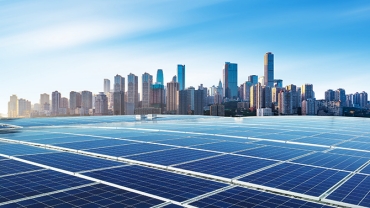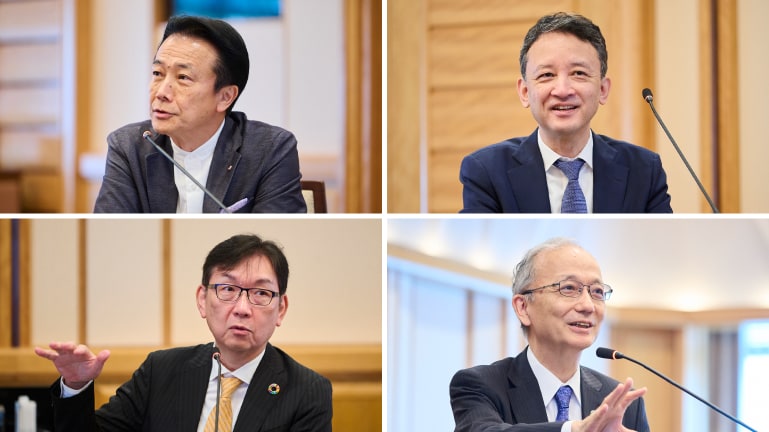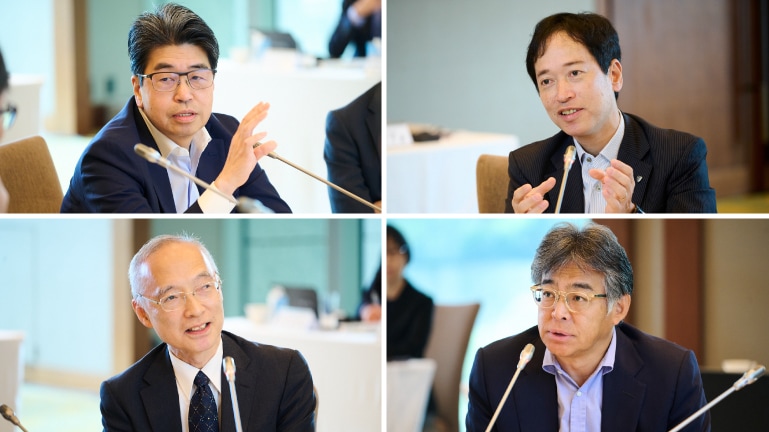
The Executive Sustainability Forum (an initiative first proposed by the PwC Japan Group, which serves as the secretariat; hereinafter, ‘the Forum’) held its fourth meeting in Tokyo on 26 June and 12 July 2024. Executives from 13 Japanese companies dedicated to sustainability management participated, with different attendees on each day. As the forum shifts the focus of its activities from deskbound research to onsite information-gathering, participants discussed the challenges involved in achieving a circular economy, as well as the general direction of the forum’s activities in the future.

Top left: Taro Fujie, President and CEO, Ajinomoto Co., Inc.
Top right: Yukio Kani, Global CEO and Chair, JERA Co., Inc.
Bottom left: Akimoto Uchikawa, President and CEO, Teijin Limited
Bottom right: Toru Takakura, President, Sumitomo Mitsui Trust Holdings, Inc.
Participation in three key events in Japan and overseas in the first half of 2024
Since its first meeting in November 2022, the activities of the Forum have primarily focused on desk-based research, including work to clarify the concept of a circular economy and its associated challenges in the Association of Southeast Asian Nations (ASEAN) region. Since the second half of 2023, the forum has been liaising with companies and groups engaged in circular economy initiatives in ASEAN to learn from their experiences, and is now shifting to a new phase of considering and analysing solutions that meet the needs of the region.
Between January and June 2024, forum members participated in three major events in Japan and overseas, which served as vital opportunities for information exchange and collaboration. At the World Economic Forum in Davos, Switzerland, in January, a Joint Statement on the Circular Economy and Carbon Neutrality was published. In April, the Forum hosted a panel discussion at Ecosperity Week 2024 in Singapore, one of Asia’s largest sustainability events, focused on companies engaged in circular businesses in ASEAN. During the event, the forum gathered insights on the region’s status and progress towards a circular economy. In May, forum members participated in the Nikkei Forum 29th Future of Asia, held in Tokyo, where discussions emphasised the importance of a circular economy in ASEAN.
Looking back on these three events, representatives of participating companies made a number of positive comments, noting that they ‘were able to have constructive debates while receiving feedback from participating companies from Japan, Asia and elsewhere around the world.’ They also said they were ‘able to confirm a shared understanding of the issues with people who are playing a central role in sustainability in ASEAN countries, and widen our sphere of cooperation.’ Furthermore, they were able to ‘confirm the importance of these meetings as a platform for major players from around Asia to engage in conversations and debates on issues facing the circular economy in Asia.’ Some participants noted that ‘Japan could perhaps play more of a role.’

Top left: Nobumitsu Hayashi, Governor, Japan Bank for International Cooperation
Top right: Toshiaki Sumino, President, The Dai-ichi Life Insurance Company, Limited
Bottom left: Mitsuru Ota, Chairman, Development Bank of Japan Inc.
Bottom right: Takahito Tokita, CEO, Fujitsu Limited
Eight priority areas for the Executive Sustainability Forum, and debates towards concrete solutions
Building on research findings and discussions at the first three meetings, the Forum has worked to clarify the concept of a circular economy and identified eight key priority topics of particular importance for ASEAN and Japanese companies. At the fourth meeting, Teijin, one of the forum’s participants, introduced and shared insights on an innovative initiative to recycle raw materials, contributing to the establishment of a circular value chain for plastics—an urgent issue globally and in ASEAN. Forum participants exchanged views on how to implement this initiative successfully and shared insights on overcoming the challenges involved.
Eight priority areas

Akimoto Uchikawa, president of Teijin, mentioned two main challenges. The first was the imbalanced distribution of the benefits of created environmental value. For example, even if upstream companies such as Teijin develop materials that reduce the burden on the environment, the benefits of that value, such as reduced greenhouse gas emissions, largely go to downstream industries that produce and use the end products. As a concrete example, he cited Teijin’s carbon fibre materials. Although the production process emits large amounts of carbon dioxide (CO2), these materials provide value by making lighter aircraft possible, which, in turn, reduce CO2 emissions. Nevertheless, he said, there is an imbalance in the way the values are distributed, since it is manufacturers of freight aircraft downstream that use these carbon fibre materials and benefit from the reductions made possible (a reduction of nearly 10% in CO2 emissions over approximately 10 years in the case of aircraft, for example).
On a global scale, while Europe seeks to reduce environmental burdens by transitioning away from chemical industries and towards downstream industries, there is often a tendency to look critically at emerging economies with heavy concentrations of upstream industries, which help fill the production gap created by this shift.
Mr. Uchikawa suggested that to address these imbalances, it will be necessary to build a framework in which value is distributed fairly across the entire value chain. This would also incentivise innovations in upstream materials that can help reduce the environmental burden downstream.
The second issue raised was the need to balance the advantages of resource recycling against innovations in the carbon cycle, such as switching to cleaner fuels and raw materials. While recycling, which includes collecting materials spread around the world, involves huge amounts of work and high costs, another approach is to significantly reduce the environmental impact of production by switching to cleaner fuels and raw materials. ‘Recycling has benefits in terms of the environmental and social aspects, but also considerable downsides economically,’ Mr. Uchikawa said. ‘I still ask myself the fundamental question: is circularity really the most rational option? If it is possible to switch materials and energy sources, might that not make more sense both environmentally and economically?’
In response, a representative from one of the participating companies agreed, stating: ‘If we are serious about wanting to do the best for the environment and society, we need to rethink the business model and winning strategy that have prevailed in the past, which has been to leave everything to market principles. We must remake our value-creation strategies, including R&D across the entire value chain,’ endorsing Mr. Uchikawa’s understanding of the problem.
A participant from a financial institution introduced investment trusts as a potentially useful model for the distribution of value and responsibilities. In this system, roles and responsibilities are divided among capital holders, asset managers, supervisors and others who ensure the system operates according to the agreed-upon rules. The compensation for each role is set out in agreements exchanged by all parties at the outset. This model was suggested as a potential framework for distributing value and responsibilities within the value chain.
Regarding the positive and negative aspects of recycling, there was agreement among several participating companies that ‘in calculating the external economic efficiency and environmental burden, while recycling is the best option in some cases, there may be others in which incinerating materials makes more sense. We should take a case-by-case approach (rather than taking it for granted that everything should be recycled).’
Other opinions included the view that ‘leasing companies, which manage and understand the long-term lifecycle of products, could have an important role to play’ in understanding the end position of automobiles and aircraft and incorporating them into the recycling cycle.
Strengthening activities to achieve a circular economy rooted in ASEAN
In the second part of the meeting, opinions were exchanged on the future activities of the Forum. As well as considering various issues with regard to the global situation and ASEAN, all parties agreed to continue conversations into the future, including establishing a review committee to consider options for creating business opportunities to promote and implement the circular economy.
There was also an exchange of views on systemic investing as one major topic to be considered in the future. The current standard investment approach involves diversifying portfolios to minimise risk by spreading investments across multiple projects and businesses. In contrast, systemic investing aims to discover connections between seemingly independent investment projects and create new business systems. This approach invests in multiple businesses at the same time to mitigate risks that could disrupt the overall system, while nurturing elements that can improve profitability.
There are two ways of thinking about increasing profitability through systemic investing. One is spatial expansion, which takes businesses that would struggle to be profitable on their own, and invests in them collectively as part of an ecosystem. For example, rather than investing simply in a transportation system, such as a project to establish train or bus lines, an investor might look to develop the area so as to encourage movement of people by building residential developments along the line or entertainment-related facilities.
The second approach is phased expansion, where investors develop a long-term blueprint for systems that will emerge once uncompleted technologies become viable. They invest in stages to build towards that future vision while minimising risk. This is similar to how the Industrial Revolution, driven by the steam engine, spurred widespread capital investment and structural transformation.
Sustainability-related businesses have historically had problems with profitability. The participating companies agreed to continue discussing ways to overcome these problems, including systemic investing, and to examine the key elements for successful sustainability transformation (SX) across different industrial sectors.
The forum was launched in 2022 on the belief that adopting region-specific measures is essential for sustainable growth in Asia, including Japan, while sharing the aim of achieving sustainability management in the global community. The forum will continue to seek realistic answers that contribute meaningfully to achieving sustainability in the world, while considering the distinctive conditions in Asia, which differ from those in Europe and North America. It will continue to facilitate discussions between executives from diverse industries and foster cross-company collaboration to contribute to global sustainability efforts.
*Company names and job titles are as of the time of the event.


